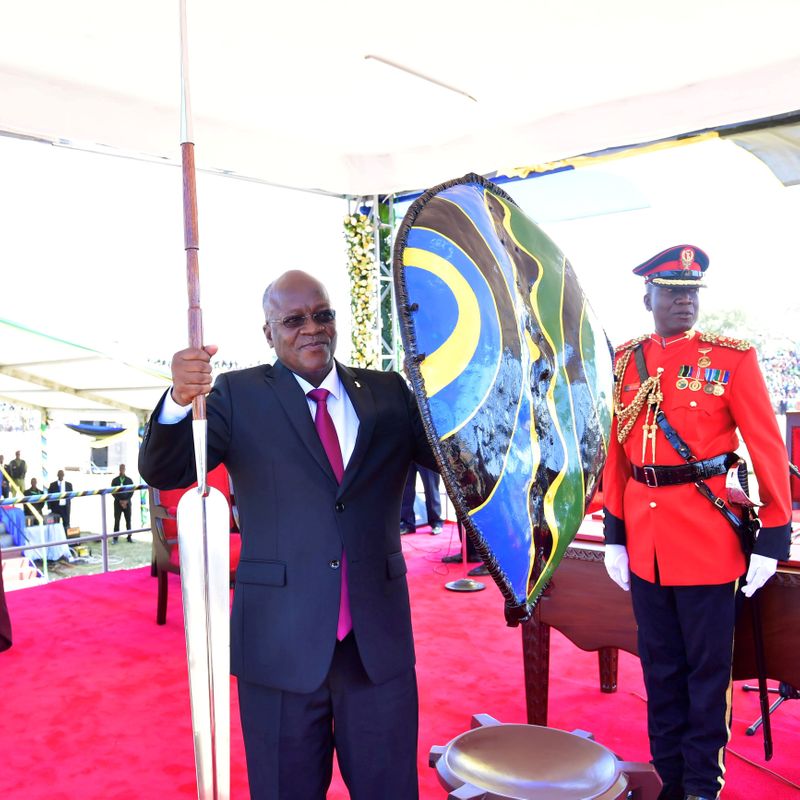NAIROBI (Reuters) – Tanzania’s main opposition leader has demanded information on the health of President John Magufuli, a prominent COVID-19 sceptic whose absence from public view has brought speculation he is receiving medical treatment abroad.
Tanzania’s government has made no official comment.
The Nation newspaper in neighbouring Kenya reported that an African leader not seen in public for nearly two weeks was being treated for COVID-19 on a ventilator at Nairobi Hospital, a private hospital in the Kenyan capital.
It cited unidentified political and diplomatic sources for the report and did not identify the leader.
Magufuli, a 61-year-old leader nicknamed “The Bulldozer,” was last seen in public on Feb. 27 looking his normal self as he swore in a new chief secretary at State House in Tanzania’s commercial capital Dar es Salaam.
He has been out of public view for periods in the past.
“The president’s wellbeing is a matter of grave public concern. What’s it with Magufuli that we don’t deserve to know?”, opposition leader Tundu Lissu said in a tweet late on Tuesday as rumours flew on Tanzanian social media.
“It’s a sad comment on his stewardship of our country that it’s come to this: that he himself had get COVID-19 and be flown out to Kenya in order to prove that prayers, steam inhalations and other unproven herbal concoctions he’s championed are no protection against coronavirus!” added Lissu, without providing evidence.
On Wednesday, Lissu told Reuters that multiple sources had told him that Magufuli was in Nairobi Hospital but that there were now plans afoot to move him to India.
Reuters was unable to confirm the accounts from the Nation or Lissu. Kenya’s Foreign Ministry and Nairobi Hospital both said they had no information to disclose.
Magufuli’s director of communications Gerson Msigwa and government spokesman Hassan Abbas did not respond to Reuters messages left seeking comment.
‘VACCINES ARE NOT GOOD’
Magufuli has played down the threat of COVID-19 in Tanzania and scoffed at global panic. He urged Tanzanians to put faith in prayer and homespun remedies such as steam inhalation rather than vaccines, which he said were dangerous and part of a Western conspiracy.
“Vaccines are not good. If they were, then the white man would have brought vaccines for HIV/AIDS,” he said earlier this year. Last year he dismissed coronavirus testing kits, which he said had returned positive results on a goat and pawpaw fruit.
Tanzania stopped reporting coronavirus data in May last year when it said it had 509 cases and 21 deaths, according to data held at the World Health Organization, which has called on the country to share its information.
Fuelling concern about a possible hidden epidemic, a top opposition politician on Tanzania’s autonomous Zanzibar archipelago, Seif Sharif Hamad, died last month of what his party said was COVID-19.
Even as COVID-19 spread around Africa, Tanzanians were still allowed to gather, for example to watch sport.
Magufuli was first elected in 2015 and beat Lissu to win re-election last year. He has faced accusations from Western countries and opposition parties of eroding democracy, which he denies.
Magufuli has a history of heart issues, according to a senior Tanzanian medic close to the government who asked not to be identified, and a private security official in Kenya with extensive official contacts in Tanzania.
(Reporting by Duncan Miriri and David Lewis; Writing by Andrew Cawthorne; Editing by Peter Graff and Philippa Fletcher)





















